Zucker School of Medicine at Hofstra/Northwell General Surgery Residency Program at Vassar Brothers Medical Center
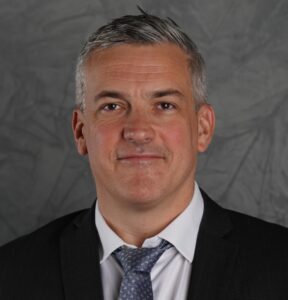
Message from the Program Director
The Zucker School of Medicine at Hofstra/Northwell General Surgery Residency Program at Vassar Brothers Medical Center offers a comprehensive and dynamic surgical training experience. Our residents are immersed in a high volume of both routine general surgery and complex subspecialty cases at our primary site, all under the guidance of dedicated, fellowship-trained faculty.
While many of our graduates successfully match into competitive fellowships, our curriculum is equally designed to prepare residents to thrive in general surgery practice immediately after training. What makes our program most unique is the deep exposure to complex surgical cases within a highly capable, community-based hospital. Residents benefit from the rigor of a tertiary center while training in a more personable, supportive environment. Since over 90% of your training will occur at a single hospital, our residents benefit from a deep level of personal mentorship which facilitates entrustment.
Key experiences include:
- Comprehensive Surgical Oncology – robust exposure to breast, GI, HPB, thoracic, head/neck, and melanoma.
- Hepatobiliary & Pancreatic Surgery – high-volume service, including minimally invasive liver and pancreas cases.
- Trauma Surgery – Vassar Brothers is a Level II trauma center and residents are exposed to trauma during their entire 5 year residency. For a deeper experience, our senior residents rotate to Cooper in New Jersey for a robust experience in operative/penetrating trauma.
- Minimally Invasive & Robotic Surgery – advanced robotic and laparoscopic training, including bariatric surgery. We have multiple robots including two teaching consoles.
- Cutting-Edge Cancer Therapies – Hyperthermic Intraperitoneal Chemotherapy (HIPEC) and Isolated Limb Infusion (ILI), rare offerings in a community setting.
- Breast Surgery – complete multidisciplinary program, including reconstruction, under the direction of an internationally recognized breast surgeon.
- Vascular Surgery – progressive training in both endovascular and open techniques, which a high-volume of complex cases without vascular fellows.
In 2021, Vassar Brothers Medical Center opened a state-of-the-art, 750,000 sq. ft. patient pavilion featuring 15 new OR suites, an innovative conference center, and all private rooms—enhancing both patient care and the educational environment for our residents.
Our faculty is energetic, engaged, and deeply committed to teaching. With a 1:1 faculty-to-resident ratio, each resident is paired with a dedicated mentor and supported by a strong, collegial community. Resident wellness is a priority—we believe that excellence in training must be paired with efforts to protect health and well-being.
Because we host only one fellowship (breast surgery), our residents are at the center of all teaching and operative opportunities. From day one, you are an active member of the surgical team, with hands-on exposure and meaningful, progressive responsibility.
We seek great people with the potential to become excellent physicians—well-rounded surgeons prepared for community practice, or fellowship training.
We are proud of our facilities, our clinical excellence, and—most importantly—the supportive culture we’ve built at The Zucker School of Medicine at Hofstra/Northwell General Surgery Residency Program at Vassar Brothers Medical Center. We invite you to join us and discover the difference of training in a program where residents are “part of the family.”
Dr. James Nitzkorski, MD, FACS, FSSO
Medical Director, Surgical Oncology
Program Director, General Surgery Residency Program
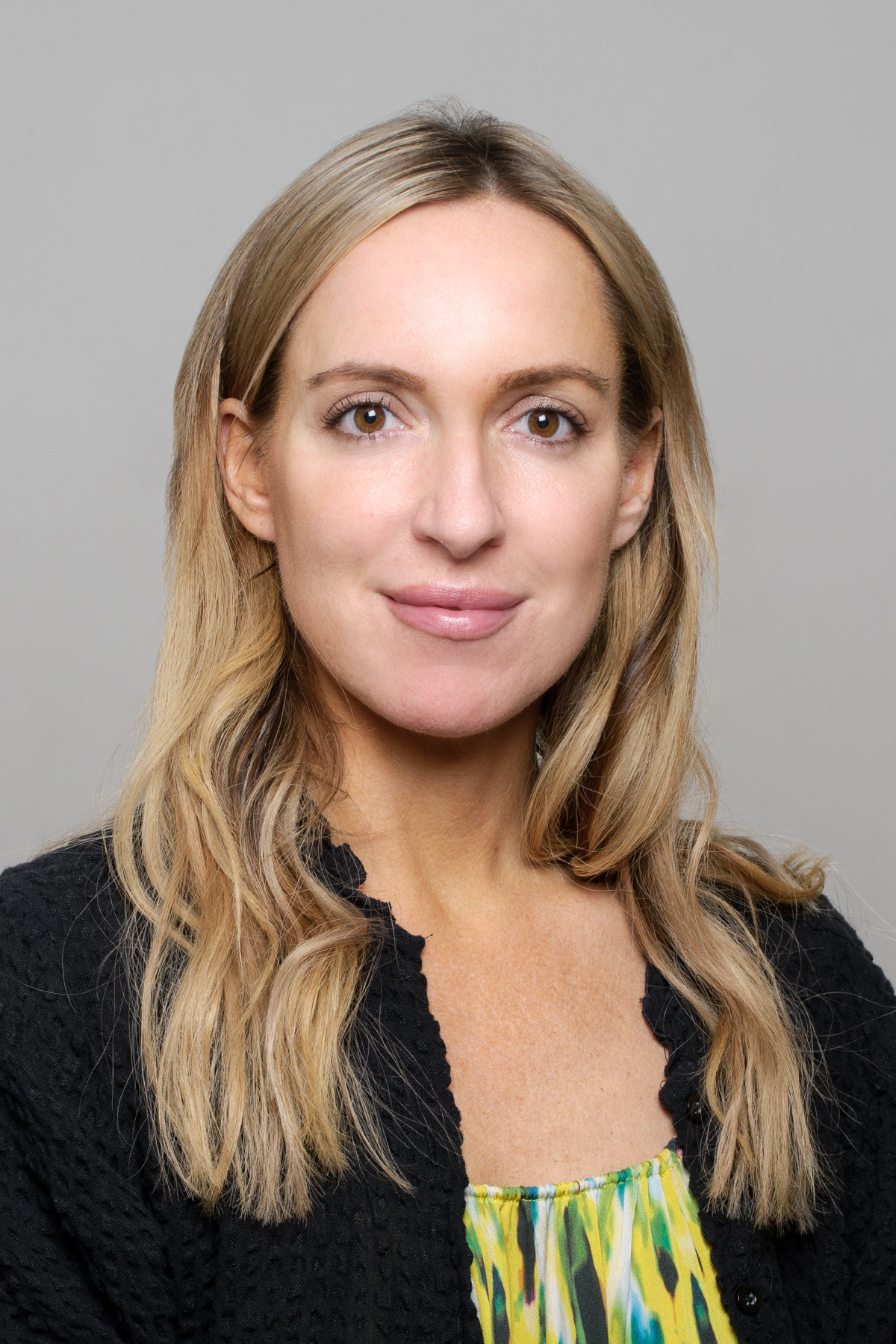 For questions or more information, contact Program Manager, Maggie Forte margaret.forte@nuvancehealth.org or (845) 790-1311
For questions or more information, contact Program Manager, Maggie Forte margaret.forte@nuvancehealth.org or (845) 790-1311
Statement on Diversity
The Department of Surgery at Northwell Health – Vassar Brothers Medical Center is committed to fostering a culture that reflects the incredibly rich diversity of our community and of the patients we treat. The Department of Surgery welcomes individuals of all backgrounds, cultures and individual differences regardless of ethnicity, gender, race, religion or sexual orientation.
Nuvance Health is Joining Northwell Health
Program Structure
Residency Experience by Year
PGY-1 – Building the Foundation
-
Entire year at Vassar Brothers Medical Center
-
100–150 operative cases during the intern year would be typical
-
Early exposure to robotic surgery
-
Direct responsibility for patient care on the wards and in the OR
-
Rotations: General/Colorectal Surgery, Acute Care/Trauma, Surgical Oncology, Vascular Surgery, Intensive Care Unit
PGY-2 – Growing Autonomy
-
Year primarily at Vassar Brothers, with 1 month at NewYork-Presbyterian in Pediatric Surgery
-
Increasing independence in surgical consultations (ED and inpatient)
-
Robotic training expands — bedside and early console work
-
Rotations: Vascular Surgery, General/Colorectal Surgery, Acute Care/Trauma, Endoscopy, Breast Surgery, Palliative Care, Intensive Care
PGY-3 – Transition to Senior Resident
-
Residents step into team leadership roles
- Year primarily at Vassar Brothers, with 1 month at NewYork-Presbyterian in Liver Transplant Service
-
Deep operative experience on Surgical Oncology with complex cases
-
1 month on Head & Neck Surgery
-
Additional rotations: Vascular, Breast, General Surgery
PGY-4 – Operative Depth & Supervisory Role
-
Heavy operative year with increased independence
-
Elective rotation option (Vassar Brothers or external site, continent upon program approval)
-
Immersive Trauma Surgery month at Cooper University, Camden NJ
-
Bariatric Surgery rotation at Northern Dutchess Hospital
-
Rotations also include Thoracic Surgery, General/Colorectal, Acute Care/Trauma
-
Begin sharing Chief Call responsibilities equally with PGY-5 residents
PGY-5 – Chief Resident Year
-
Full leadership role: running services, supervising juniors, teaching students
-
Mastery of operative technique across routine and complex surgery
-
Active involvement in quality improvement and program leadership
-
1,200–1,400 operative cases typical at graduation
-
Graduates are fully prepared for independent practice or fellowships
Training Sites
Residency Training Sites
Vassar Brothers Medical Center (Primary Site)

The majority of residency training takes place at Vassar Brothers Medical Center in Poughkeepsie, NY. This state-of-the-art facility includes a 750,000 sq. ft. pavilion with 15 modern ORs, an advanced conference center, and all private patient rooms. Residents gain broad exposure to both high-volume routine surgical care and complex subspecialty cases, all within a collegial, community-based academic environment.
NewYork-Presbyterian/Columbia University Irving Medical Center

Residents rotate at NewYork-Presbyterian/Columbia, a world-renowned quaternary referral center, for Pediatric Surgery (PGY-2) and Liver Transplant (PGY-3). These experiences offer exposure to highly specialized care delivered by national leaders in surgery.
Housing is provided at NY Presbyterian.
Cooper University Hospital (Camden, NJ)

PGY-4 residents spend a month at Cooper University Hospital, a busy Level I trauma center. This immersive rotation ensures robust training in trauma resuscitation and operative management.
Housing is provided at Cooper.
Northern Dutchess Hospital (Rhinebeck, NY)
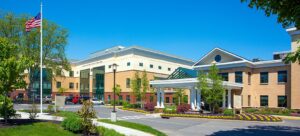
Residents rotate at Northern Dutchess Hospital for Bariatric Surgery and General Surgery. This site provides valuable experience in a smaller, more rural community hospital setting, where residents learn to deliver excellent surgical care with fewer resources than at a large tertiary center. This perspective is critical for developing adaptability and confidence in diverse practice environments. Northern Dutchess Hospital is a short drive from the main campus at Vassar Brothers Medical Center, and utilizes the same EMR so transitions to Northern Dutchess Hospital are less stressful.
Education & Curriculum
Education & Curriculum
Journal Club
From the start of residency, interns and residents participate in Journal Club to critically appraise recent studies and practice the principles of evidence-based medicine.
Intern Boot Camp
During the first week, new residents complete an Intern Boot Camp designed to ease the transition into residency. This orientation covers essential clinical and non-clinical topics, including:
-
Culture and expectations
-
EMR training
-
Skills lab, such as NG tube placement, foley placement, central line placement, POCUS and FAST exams
-
Introduction to simulation lab (robot trainer, laparoscopic trainer, endoscopic trainer, etc)


ABSITE – In-Training Exam
All residents complete the annual American Board of Surgery In-Training Exam (ABSITE). Results are reviewed individually with the Program Director to track progress, identify strengths, and guide personalized preparation in areas such as reading, electives, and board prep.
Academic Half Day
Every Thursday morning, residents have protected educational time dedicated to didactics, case-based learning, and skill development. Sessions are aligned with the SCORE Curriculum and supported by resources such as TrueLearn, ABSITE Quest, and faculty-led educational sessions.

Core Educational Conferences
-
Morbidity & Mortality (M&M): Weekly, Thursdays at 7 am.
-
SCORE Conference: Weekly, Thursdays at 8 am. Residents use SCORE’s comprehensive platform, which includes:
-
470+ surgical modules
-
This Week in SCORE (TWIS) curriculum
-
Chapters from 15 surgical textbooks
-
2,400+ practice questions
-
230+ narrated operative videos
-
170+ SCORE School webinars
-
80+ anatomical illustrations
-

Film Club
Held monthly, Film Club uses operative videos to break down surgical technique, decision-making, and higher-level concepts. These small-group, faculty-moderated sessions allow for interactive teaching and discussion.
Multidisciplinary Tumor Conference
Residents are encouraged to attend multidisciplinary tumor boards. Residents on the Breast Surgery rotation present their own clinic patients at conference. Other tumor boards include:
-
Thoracic
-
Rectal/GI
-
Head & Neck
Grand Rounds
Grand Rounds cover a broad range of medical and surgical topics, featuring expert faculty and guest speakers.
Simulation Training
Residents participate in simulation throughout the year. Recent sessions have included:
-
Trauma resuscitation
-
Escape room – surgical skill and situational awareness training.
-
Laparoscopic skills training
-
Robotic surgery simulation
- Cadaver lab, hand-sewn anastomosis


Robotic Surgery Certification
Residents planning to incorporate robotics into their practice are supported in completing Da Vinci Robotic Surgery Certification before graduation.
Schwartz Rounds
Held quarterly across the health system, Schwartz Rounds focus on resident wellness and professional resilience. Recent sessions included “Nurturing Resilience in Ourselves and Others” and “Injustice and Bias in Healthcare.”
Palliative Care
Our program was one of the first in the country to incorporate a dedicated Palliative Care rotation into the surgical residency curriculum. During PGY-2, residents complete a month-long rotation, including a simulation workshop with standardized patients focused on breaking bad news and disclosing adverse events in a safe learning environment.

Through structured didactics, simulation, multidisciplinary collaboration, and innovative programs, our residents graduate with not only operative expertise but also the professionalism, communication skills, and resilience required for modern surgical practice.
Resident Wellness
Resident Wellness
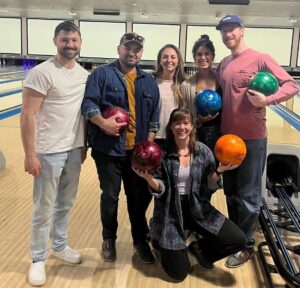
Residents who are well make excellent physicians. At Vassar Brothers, wellness is not an afterthought—it is an integral part of our residency culture. We believe that supporting physical health, mental well-being, and professional growth creates better doctors and stronger teams.
Wellness Initiatives
-
Peloton bike in the Call Room for quick exercise breaks
-
Resident-only gym within VBMC with free weights, rack, yoga mats, treadmill, and elliptical
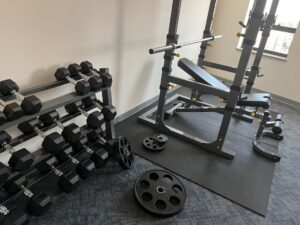
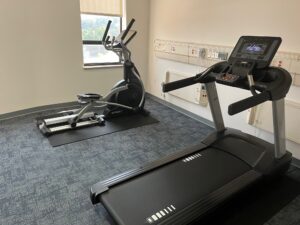
-
Newly refurbished call room space designed for comfort during long shifts
-
Annual welcome party to celebrate new residents
-
Residency-sponsored events such as hiking, axe throwing, and apple picking
-
Collegial, respectful atmosphere where teamwork is prioritized.
Work Hours & Support
-
Strict adherence to the 80-hour work week and New York State duty hour restrictions
-
Access to mental health and coaching services and the Employee Assistance Program
-
Anonymous feedback options to ensure residents’ voices are heard
-
Faculty open-door policy for mentorship and support
Fifth Thursday Program
When a month includes a fifth Thursday, residents are dismissed after didactics to focus on wellness activities or personal needs—such as scheduling medical appointments or simply taking time for rest.
Team Support: Surgical PA Program
Our large Surgical PA Program is embedded within the general surgery teams. PAs share in call responsibilities and daily care, reducing “service” burden on residents and preserving the educational focus of residency training.
Call Structure
Overnight call varies by rotation but is typically q4. Call is variable depending on the residency year and rotation. Call is never more frequent than q3, and can be q6.
Residents as Teachers and Leaders Course
Each year, all senior residents attend the Residents as Teachers and Leaders Course at the American College of Surgeons in Chicago. This immersive program, taught by nationally recognized faculty, develops essential nonclinical skills in:
-
Leadership and team management
-
Conflict resolution
-
Teaching and feedback
-
Professional growth beyond residency
By combining wellness initiatives, strong support systems, and nationally recognized leadership training, our program ensures residents thrive both personally and professionally.
Curriculum Design
Curriculum Design
At Vassar Brothers, we believe the best residency programs evolve with their residents. Resident feedback is central to our success, and trainees regularly meet with faculty and the Program Director to review and refine the educational experience. This collaborative approach has led to meaningful improvements in curriculum and training.
Recent Enhancements
-
Formal PGY-2 Palliative Care Rotation
Vassar Brothers is one of the few surgical residency programs in the country to establish a dedicated palliative care rotation. This innovative experience equips residents with essential skills in communication, end-of-life care, and the management of complex patient needs. -
Formal PGY-4 Trauma Surgery Rotation at Cooper University (Housing Provided)
To enhance our robust Level II Trauma experience at VBMC, residents now spend a dedicated month at Cooper University Hospital, one of the busiest trauma centers in the country. Housing is provided, ensuring residents can focus fully on this high-volume, immersive rotation.
Research and Quality Improvement Opportunities
Research in Surgery
Faculty Leadership
In 2024, the Department of Surgery welcomed Kyle J. Thompson, PhD as Director of Surgical Research.
-
Dr. Thompson’s early work focused on obesity as a risk factor for hepatocellular carcinoma.
-
He later served as a Senior Data Scientist at the Carolinas Center for Surgical Outcomes Science before joining Nuvance Health.
Dr. Thompson holds regular office hours in the GME Suite at Vassar Brothers Medical Center to guide residents and faculty in research design, data analysis, and project development.
Clinical Trials
Residents have the opportunity to engage in ongoing cancer clinical trials at Nuvance Health, including:
-
Breast Cancer
-
Colorectal Cancer
-
Melanoma
-
Lung Cancer
-
Genetic Cancer
-
Gynecologic Oncology
Quality Improvement & Outcomes Research
-
Quality Assurance Officer: Dedicated support for residents in project design, implementation, and analysis of QI initiatives.
-
Quality Assurance Committees: Located at each training site, giving residents insight into hospital-level quality and safety strategies.
-
National Databases: Residents have access to NSQIP (national surgical registry), along with VQI and STS, to conduct robust outcomes-based research using national-level datasets.
All data is maintained in a cloud-based research library, allowing residents to collaborate and analyze projects efficiently across sites.
Patricia Tietjen Teaching Academy (Available to Residents)
Residents have access to the Patricia Tietjen Teaching Academy, a system-wide faculty development program tailored to trainees who want to sharpen their teaching, leadership, and education scholarship skills. Offerings include:
-
Residents-as-Teachers Curriculum: Practical workshops on bedside teaching, micro-teaching, feedback delivery, and learner assessment.
-
Education Scholarship Support: Guidance on study design, IRB navigation, and dissemination (abstracts, posters, manuscripts) with coaching from education scholars.
-
Curriculum Design & Simulation: Sessions on writing objectives, building session plans, and leading simulation-based teaching.
-
Teaching Portfolio Development: Structured templates and mentorship to document your teaching, QI/education projects, and national presentations.
-
Certificate Pathway: Option to complete a Teaching Skills Certificate with capstone presentation.
-
Protected-Time Sessions & Small-Grant Opportunities: Periodic protected-time workshops; select micro-grants available for education initiatives.
Why it matters: The Academy pairs seamlessly with our research infrastructure—helping residents transform QI and outcomes projects into education scholarship, strengthen presentation skills, and graduate with a competitive teaching portfolio for fellowship or academic practice.
With strong mentorship, institutional support, and access to national registries and clinical trials, our residents graduate with the skills to become not only excellent surgeons, but also experienced in research and quality improvement.
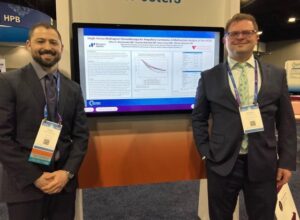
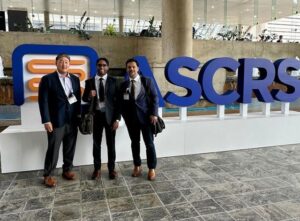

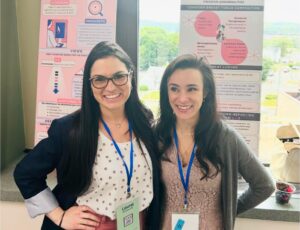
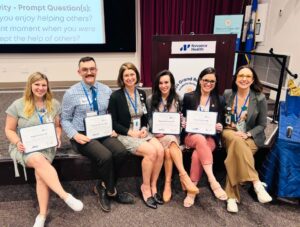
Operative Experience
Operative Experience
Early, robust operative exposure with dedicated supervision and teaching is a hallmark of our program.
-
PGY-1: Interns typically log 100–150 cases in their first year, and some interns have exceeded 200 cases. From the start, residents are active participants in the operating room and gain hands-on experience across a broad range of general surgery.
-
Chief Year: By graduation, residents typically log 1,200–1,400 operative cases, encompassing both routine and complex procedures.
Focused Resident Experience
With only one fellow in Breast Surgery—(who spends part of the year at Danbury Hospital) —our residents have priority in the OR. This ensures that clinical and operative opportunities at Vassar Brothers Medical Center are resident-centered without significant competition from fellows.
Strength in Complex Surgery
Our program offers exceptional exposure to complex hepatobiliary and pancreatic surgery. Based on case log data, some residents have ranked in the 95th percentile nationally for liver and pancreas operations.
From high operative volumes to complex case exposure, our graduates leave fully prepared for independent practice or fellowship training, confident in their surgical skills.
Simulation & Teaching
Simulation & Teaching

Simulation Training at Vassar Brothers
In 2024, a brand-new Simulation Center was opened within the resident space at Vassar Brothers Medical Center. All residents gain structured experience in simulation, with additional opportunities for independent practice.
-
Da Vinci Robotic Skills Simulator: Available 24/7, including nights and weekends, so residents can practice while on call.
-
Robotic Surgery Curriculum: Designed to build progressive proficiency—starting with basic and bedside skills, advancing to the dual-console robotic platform. By graduation, residents are prepared for independent robotic practice.
-
Endoscopy Curriculum: Formal training combined with periodic workshops.
Workshops & Skills Labs
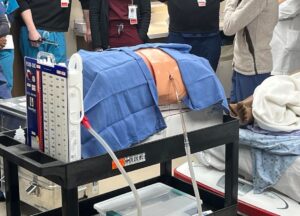
Residents participate in regular hands-on workshops, which have included:
-
Vascular anastomosis
-
Skin closure
-
Airway management
-
Surgical stapling
-
Robotic surgery day
-
Intra-operative fluorescence
- Oral Board Review
Harold A. Spratt Center for Simulation and Clinical Learning (Danbury Hospital)
In addition to the simulation lab at Vassar Brothers, VBMC residents also have access to the Harold A. Spratt Center for Simulation and Clinical Learning, a state-of-the-art facility at Danbury Hospital. Highlights include:
-
Flexible environments replicating ORs and exam rooms
-
Control rooms with one-way glass for real-time faculty oversight
-
High-fidelity manikins with realistic physiology and pathology
-
Functioning gas panels (oxygen, air, suction) and vital sign monitors
-
Audio/visual systems for recording, playback, and structured debriefing
-
Standardized patient program with trained actors
-
Dedicated educational and technical staff for optimized training
Teaching Roles for Residents
Nuvance Health – Vassar Brothers Medical Center is a primary teaching site for third- and fourth-year students from Touro College of Medicine, as well as visiting medical students.
Residents play a central role in teaching, including:
-
Medical Students: Bedside instruction, operative teaching, and mentoring.
-
Other Residency Programs: PGY-1 residents from the Transitional Year program rotate on Trauma join the surgical team, with surgical residents taking on teaching and supervisory roles.
How to Apply & Applicant FAQs
How to Apply
We accept all applications through the Electronic Residency Application Service (ERAS) and participate in the National Resident Matching Program (NRMP) annually.
Find us in ERAS: ACGME ID #4403500450
Find is in NRMP: NRMP ID # 2495440C0
*Please note: Individual requests for review outside of ERAS are not considered, and the program does not respond to unsolicited emails from applicants.
Application Requirements
To be considered for an interview, all of the following must be submitted through ERAS:
-
Personal Statement
-
Curriculum Vitae (CV)
-
Three (3) Letters of Recommendation (letters from surgeons are preferred but not mandatory)
-
USMLE Step 1 (or COMLEX-USA Level 1) – Pass required
-
USMLE Step 2 (or COMLEX-USA Level 2 CS) – Score required
-
MSPE (Dean’s Letter)
Interviews
-
For the 2025–2026 academic year, all interviews will be conducted virtually.
-
Once an invitation is sent, applicants have 48 hours to accept or decline. Invitations not answered within 48 hours will be automatically withdrawn.
-
May accept H1B Visas
Second Look
An optional on-site Second Look will be offered later in the season.
-
Attendance is not required.
-
The program’s rank list will be finalized prior to the Second Look, so participation will not influence applicant ranking.
We look forward to reviewing your application and meeting you during interview season.
Applicant FAQ
How many categorical positions are available each year?
We offer 3 categorical positions through the NRMP Match annually. We do not have preliminary residents in surgery.
What are typical medical student performance and Step/COMLEX score requirements?
Passing scores are required for Step 1 and Step 2 (or COMLEX). Although we do not use cutoff scores, competitive applicants usually present with Step 2 CK (or COMLEX Level 2) performance around the median score for those who match into general surgery, have not experienced a failure on a licensure exam, and have not required remediation during medical school.
What are typical medical student performance and Step/COMLEX score requirements?
Passing scores are required for Step 1 and Step 2 (or COMLEX). Although we do not use cutoff scores, competitive applicants usually present with Step 2 CK (or COMLEX Level 2) performance around the median score for those who match into general surgery, have not experienced a failure on a licensure exam, and have not required remediation during medical school.
Do you sponsor visas?
We do not sponsor H-2 visas. J-1 visas are considered.
Do you accept applications outside of ERAS?
No. All applications must be submitted through ERAS. Unsolicited emails or documents sent directly to the program are not considered.
Are interviews in person or virtual?
For the 2025–2026 academic year, all interviews will be virtual.
What is the Second Look, and does it affect ranking?
An optional on-site Second Look is offered later in the interview season. The rank list will be finalized before this date, so attendance does not influence ranking.
If you have additional questions not addressed here, please refer to our ERAS listing or contact our GME office for guidance.

